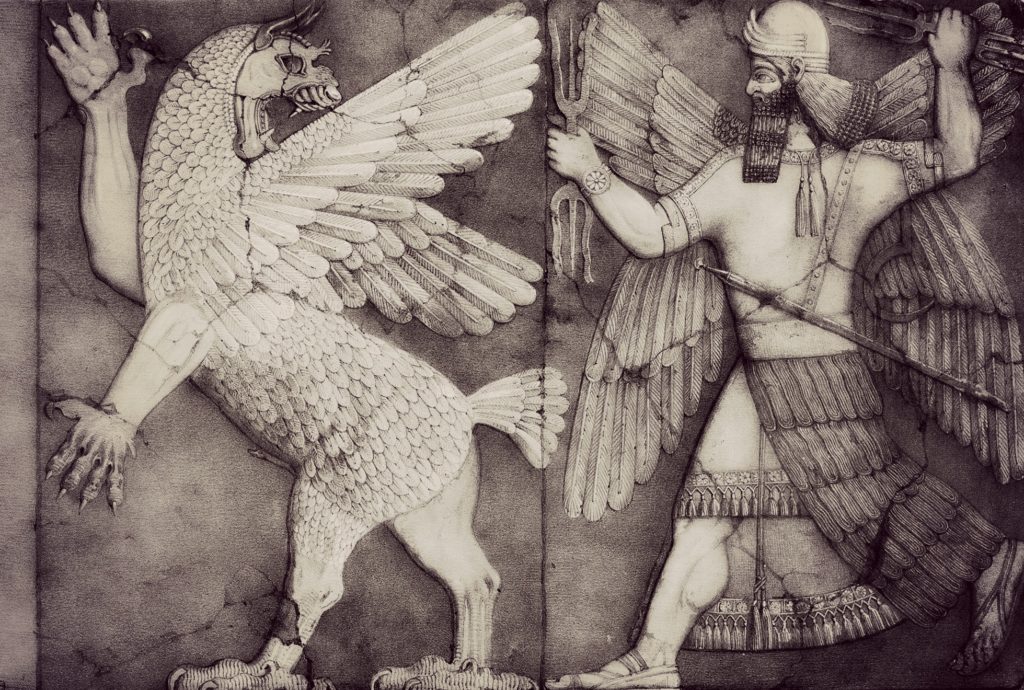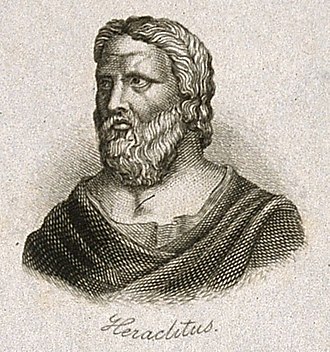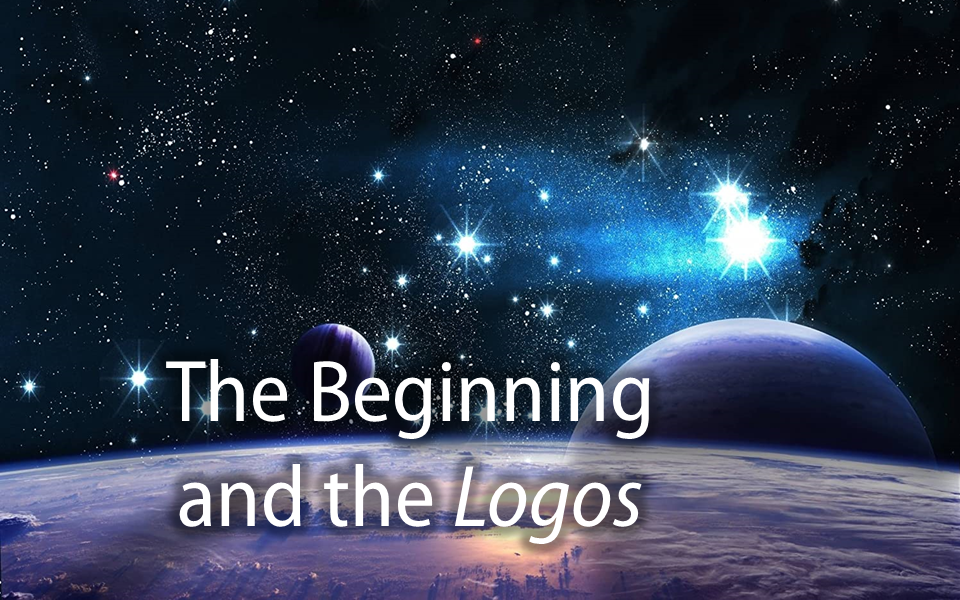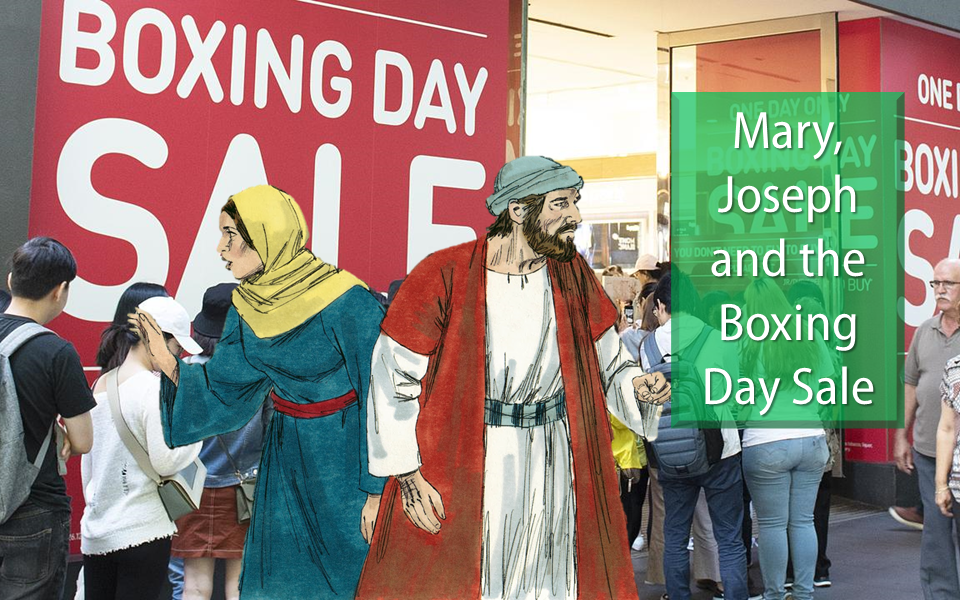Watch the sermon video here:
Hespeler, 2 January 2022 © Scott McAndless
Jeremiah 31:7-14, Psalm 147:12-20, Ephesians 1:3-14, John 1:1-18 (click to read)
If you are familiar with the passage that begins the Bible, you know that it tells the story of the creation of the world as we know it. God starts out, “in the beginning” with something referred to as the heavens and the earth. And here’s the first thing you need to know about that phrase. The ancient Hebrews did not have a word for what we call the universe. The only way they had a speaking of everything that existed was by referring to everything that they could see, the heavens (which were always plural, by the way) and the earth. That was how they spoke about the whole universe
So, in Genesis, God basically begins with everything that exists. But that everything that exists seems to be in a bit of disarray. We are told that “the earth was a formless void and darkness covered the face of the deep, while a wind from God swept over the face of the waters.” And I don’t know if you have ever encountered “a formless void,” but it doesn’t sound to me like something that you would want to run into in a dark alley.
The Elemental Formless Void
Have you ever been in that place in your life when you’ve lost something or someone that means absolutely everything to you? Do you remember how it felt, how utterly empty everything felt in that moment? You felt as if there was a hole inside you that was so big that all the tears in the world would never fill it. Well, that is maybe a helpful way to think about what is meant by a formless void. Except, I imagine, the very worst emotions you felt in that moment did get a little bit easier to manage as time went by, even if you still carry them with you. But this formless void that existed at the beginning of all things, there is something enduring about it for it is in the very structure of the universe itself. And the churning waters that it contains within it, they seem dangerous and full of chaos.
And there is a profound truth in that. It is saying that there is an inclination that is built into the very structure of the universe towards emptiness, towards darkness, chaos and loss. And I know that sounds a little bit bleak, but I really don’t think there’s any denying it. Left to itself, that is where the universe goes. In fact, this is even a truth that has been recognized by science. There is a law in the science of thermodynamics, the study of relationship between various kinds of energy, that states that in any closed system will eventually tend towards entropy. Entropy is basically a fancy word for a formless void. And the universe is the ultimate closed system. So, even science agrees that the universe tends towards a formless void.
Other Similar Creation Stories
So, that is where we start at the beginning of the Bible. But let me encourage you not to despair because the story that follows is the story about what God has done about that. Up until this point in the Bible’s creation story, there is actually very little that is different between the story of creation in Genesis and the creation myths you would have found in other ancient Near Eastern cultures. They all begin with an opening picture of a formless void and chaotic waters. Some of the ancient myths even go so far as to picture the pre-existing chaos as a great monster that threatens the very idea of existence itself. That is certainly a very memorable image, but it is still saying basically the same thing as Genesis.
But it is at this point where you start to see the Bible story diverge from the mythologies of other people. In most of these other stories, what happens next is that some hero god comes along and attacks the chaos monster in order to destroy it in a great primeval battle. In other words, we get even more chaos and entropy unleashed to defeat the original chaos and entropy.

The Spoken Word Brings Order
But the really different and interesting thing about the Bible story is that God takes a very different approach. What happens in Genesis? God speaks. “Then God said, ‘Let there be light’; and there was light.” It is the divine spoken word that has the power to bring light into the oppressive darkness. Even more important, the divine word is able to bring order to the primeval chaos as God sorts the light from the darkness and goes on to put everything – the water, the land, the various species of animals and so on each in their proper place.
That is a powerful idea, isn’t it? The notion that by speaking and naming what we see in the world, we banish the chaos and the formless void that is always threatening. And the ancient Hebrews were not the only ones to understand this important truth. The ancient Greeks also understood it and expressed it in their own way.
An Idea from Greek Philosophy

They also understood that the universe was ordered and brought into being by a word. They called it, using their own language, the logos. And logos is a Greek word that can be translated as word, but it always meant more than what we mean by word. It meant speech, but it also meant discourse and reason. In the fifth century BC, the philosopher Heraclitus of Ephesus declared that the logos was the foundational principle of the universe, the ultimate source of all knowledge and order. So, in a way, the ancient Greeks and ancient Hebrews agreed that the universe as we know it was called into being by a word.
The Gospel of John Brings it all Together
And you need to understand that all of that was in the background when the writer of the Gospel of John took his pen in hand to begin to write, in the Greek language, his account of the life and death and resurrection of Jesus of Nazareth. He began with the words, “In the beginning,” because he knew that that would make all of his readers think of the beginning of the creation story in Genesis and everything that went with the story, including the aching emptiness at the heart of the primeval formless void.
But then he goes on from there to say what was in the beginning – the logos. Yes, I know that it is translated in our Bibles as the Word. But it matters a great deal that the Greek word that he used was logos. With that one word, he managed to do something truly extraordinary. He evoked approximately 400 years of Greek thinking and philosophy on the nature of the universe, existence and being.

So, with the first six words of his gospel, this writer manages to bring together the entire Hebrew and the entire Greek understanding of the universe and the place of humanity within it and put it all together. And he expects all of his readers to make all of those connections. He wants you to think of that great formless void at the beginning of all things and at the centre of the universe.
Not Just Cosmology
But he doesn’t only want you to think of it in the sense of a theoretical tendency towards entropy as defined by the science of thermodynamics. I mean, sure, it is that. But where that formless void touches us most deeply is on a personal level. It is found in that deep-seated fear of the chaos and the darkness that I think we all recognize lurks somewhere out there in the universe for all of us. It lurks in the emptiness that we feel deep inside over the trauma or loss we have experienced. We want to know what will save us from that.
And the gospel writer’s answer to that question is the same answer that the Greek philosophers gave: the logos. It is the power of reason and discourse and the spoken word that gives order to that chaos. He even speaks of how it responds to the darkness we sometimes feel within in very specific terms. “In him was life, and the life was the light of all people. The light shines in the darkness, and the darkness did not overcome it.”
He Speaks to our Elemental Struggles
And so it is that, in these few words, we have a response to some of the most basic needs and fears that we struggle with. In the face of our fear of the formless void, the gospel writer calls us to consider how God brought order and meaning out of the primordial emptiness by speaking but a few words. In response to our dread of the chaos that seems to want to overtake this world and everything in it, he shows us the organizing principle of Greek philosophy, this idea that the logos allows us to organize the world and make sense of it.
And I think that these are very helpful answers and yet, at the same time, I think there is something missing. Because here is the problem, when you are really struggling with the existential dread that sometimes seizes us in this world, it is all well and good for someone to come to you and speak of a creator who intended that this world would be good and that you would do well in it. And it is all very well and good for someone to come and speak to you of noble philosophical concepts that give theoretical answers to the questions that sometimes overwhelm your life.
But are these things really enough when you are truly struggling? Not necessarily. They might be helpful concepts. They might be intellectually stimulating and have a logic that brings you to soothing conclusions, but that may not be enough.
We Need More than an Intellectual Answer
That may not be enough, because feelings like dread and fear and despair strike us at a level that goes much deeper than our intellect or our logical mind. These are things that affect us at some of the deepest levels of our being. That is why you cannot just reason somebody out of a depression. That is why, if you tell someone who is irrationally afraid of the dark that they have no logical reason to be afraid, it doesn’t actually help them. We need more than an intellectual understanding of the work of the creator and an explanation of philosophical principles if we are going to navigate some of the hardest things about life in this world.
And so it is that the gospel writer gives us more than just ideas and logic. He goes on to say some truly remarkable things about the logos. The first truly remarkable thing he says comes in verse one: “and the Word was with God, and the Word was God.” So here we discover that the logos is not merely the spoken word or the principle that aids God in the creation but is actually indistinguishable from the Creator. This is comforting because it means that God’s does not battle the darkness and chaos of this world as a kind of hobby, but rather because it is absolutely essential to God’s nature. For God to abandon us in the face of the formless void would actually be for God to abandon God’s self.
An Unexpected Twist
But the really surprising twist that comes in this passage arrives in verse 14: “And the Word became flesh and lived among us, and we have seen his glory, the glory as of a father’s only son, full of grace and truth.” This verse changes the course of the entire passage and takes it in a direction that is very different from the course of both Hebrew theology and Greek philosophy. We are no longer just speaking about a spoken word or a philosophical principle. We are speaking about how all of this becomes flesh, becomes one of us. And that is, of course, what the early Christians experienced in Jesus of Nazareth. And it did not necessarily make sense in terms of previous teachings or philosophies. But they knew that they had experienced something truly unique in Jesus.
Christ is the Answer
For here is the wonderful truth that is given to the people of God in Jesus. Yes, we do live our lives in the fear of the formless void. We live in the shadow of the chaos that threatens to overtake us at any moment because that is the nature of the universe. But Christ has shown us something else. Christ has shown us not only that God overcomes the darkness and the chaos, but that he is that victorious God and allows us to experience that victory in him.
It is Christ who comes alongside us to personally comfort us when we are struggling with the darkness and fear. It is Christ who, in his person, offers us meaning and purpose when the universe attempts to take those things away from us. Because he comes in the flesh, Jesus can struggle with all of those things – the fear, the darkness and that howling sense of emptiness – and can actually understand and sympathize with what it is that we feel. That is the power of the logos made flesh.
This opening prologue of the Gospel of John is a passage that pushes theology and philosophy into new territory. But don’t just think that this is about intellectual concepts of the nature of God and the universe. This is about God connecting with you exactly where you are and in the midst of the struggles of what seems to be a dark and threatening universe. It is about Jesus lightening the darkness that sometimes threatens to overwhelm you. That is what the Evangelist does for us with only six words.
